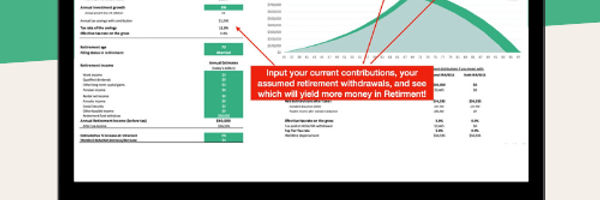This calculator can help you compare the future value of your Social Security benefits under different retirement age scenarios. The calculator can accommodate three retirement ages (early, normal, and delayed), along with the expected annual benefit at each age. Using this information, along with a projected ending age to collect benefits, the tool can provide the future value of each option.

Roth IRA or 401k? This template will answer your questions.
With this template, you will get:
All DFY, simply add your details
Charts for comparison and clear answer
Easily update for any year (2023, 2024, 2025, etc…)

Calculator Definitions
The variables used in our online calculator are defined in detail below, including how to interpret the results.
Early Retirement Age (Years)
Additional Resources |
IRA Recharacterization CalculatorMinimum Required Distribution Calculator CSRS Retirement Calculator Compound Interest Calculator Cash Out Calculator Annuity Payment Calculator |
The Social Security Administration considers the collection of benefits at the age of 62 as early retirement. However, you can enter any value you'd consider "early."
Early Social Security Benefit ($ / Year)
This is the value of the Social Security benefits you will be receiving beginning at "early" retirement age. You can find a projection for this benefit on your Social Security Statement, or by visiting the Social Security website.
Normal Retirement Age (Years)
Once again, the Social Security Administration has defined "normal" or "full" retirement age. If you were born between 1943 and 1954, normal retirement age is 65. If you were born after 1960, then normal retirement age is defined as 67. As was the case with the "early" age entered earlier, you can choose any age you'd consider "normal."
Normal Social Security Benefit ($ / Year)
This is the value of the Social Security benefits you will be receiving beginning at "normal" retirement age. You can find a projection for this benefit on your Social Security Statement, or by visiting the Social Security website.
Delayed Retirement Age (Years)
Finally, this calculator allows you to enter a third retirement age, which is labeled as "delayed." At any given level of income, monthly Social Security benefits will increase the longer the beneficiary waits to start collecting benefits. That being said, the longer the recipient waits to receive their benefits, the shorter the time over which benefits are collected.
Delayed Social Security Benefit ($ / Year)
This is the value of the Social Security benefits you will be receiving beginning at "delayed" retirement age. You can find a projection for this benefit on your Social Security Statement for a delayed age of 70.
Final Benefit Age (Years)
This is the final age you expect to collect Social Security benefits.
Return on Investment (% / Year)
The calculator contains a default value of 0% for return on investment. This allows you to make a direct comparison of the total dollars received for each of the benefits, before introducing a potential return on the money collected. For example, the default values (which are based on a real scenario), indicated there is a benefit to delaying the collection of payments from the Social Security system. However, if we assume the recipient invests that money, then the calculator may indicate an advantage for those collecting benefits earlier.
Early / Normal / Delayed Retirement Benefit ($)
This is the total of all benefits collected from the Social Security system; starting at the retirement age indicated and ending at the final benefit age. This is the future value of all benefits received for each of the selected retirement ages.
Benefit of Normal Retirement ($)
This is the calculated differential benefits received between early and normal retirement age. A positive value indicates the scenario chosen favors delaying retirement.
Benefit of Delayed Retirement ($)
This is the calculated differential in benefits received between early and delayed retirement age. Once again, a positive value indicates the scenario chosen favors delaying retirement.
Social Security Benefits Calculator
Disclaimer: These online calculators are made available and meant to be used as a screening tool for the investor. The accuracy of these calculations is not guaranteed nor is its applicability to your individual circumstances. You should always obtain personal advice from qualified professionals.



.jpg)
.jpg)